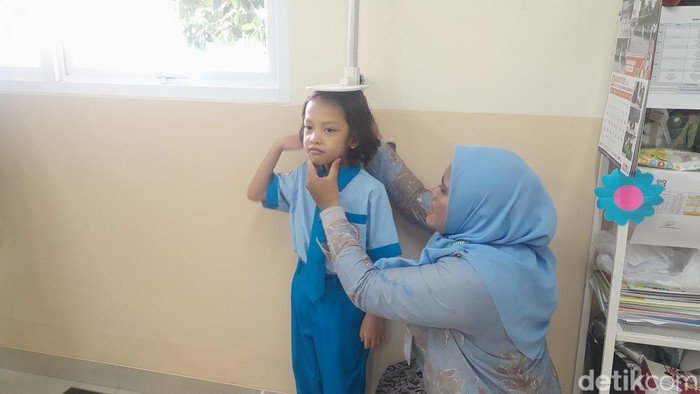Jakarta –
The free health check (CKG) program specifically for school children officially began today. This is a continuation of the general CKG program that was first launched in February 2025.
The Ministry of Health hopes that this school-specific CKG will accelerate the number of beneficiaries receiving health screenings. The examinations include eye, dental, and ear health, weight, blood pressure, height, and tuberculosis (TB) screening.
If TB symptoms are detected during the screening, students will undergo further examinations at community health centers.
Observations at Prestasi Global Elementary School in Depok showed that students were enthusiastic about the CKG. Some were initially nervous, but after the examination, everyone seemed to enjoy it.
One of the procedures included in the school CKG is immunization for measles, rubella, and HPV (human papillomavirus) for cervical cancer prevention (specifically for 5th-grade female students) if they haven’t received it yet. Afian (6), a 1st-grade student, said he wasn’t afraid of the measles and rubella immunization, even though it involved an injection.
“It didn’t hurt, just normal. I exercise a lot,” he said.
Besides immunizations, another test conducted in the school CKG is a fitness assessment. In this test, children are asked to jog around the field 14 times, covering a total distance of 1,000 meters.
The running time is recorded by the physical education teacher, and students who cannot complete the test are not forced to do so.
“It was pretty tiring. I didn’t train for this test, but I’ve walked 12 km before,” said Reyhan (9), a 4th-grade student.
“My legs are really sore. I like sports—I’ve been running since 2nd grade. I also play basketball once a week in a club,” he added.
The Deputy Minister of Health stated that the government’s target for the school CKG program is 53 million participants. He added that the examinations differ slightly from the general CKG to ensure more effective and precise diagnoses. Health issues can vary across different age groups.
“To make it more effective and sharpen diagnoses, the examinations are not the same. Each age group has different needs,” he said during a visit to Depok, West Java.
“Conducting examinations in schools is also easier. Bringing students to community health centers would be more difficult to coordinate. It’s better for health workers to come to the schools,” he continued.
Regarding HPV immunization, the Deputy Minister emphasized that cervical cancer prevention should start as early as possible. He noted that cervical cancer is the second leading cause of cancer-related deaths among women in Indonesia.
“HPV immunization is a way to prevent cervical cancer, which usually occurs after marriage. By administering the HPV vaccine, cervical cancer can be prevented. This should be done as early as possible,” he stressed.






